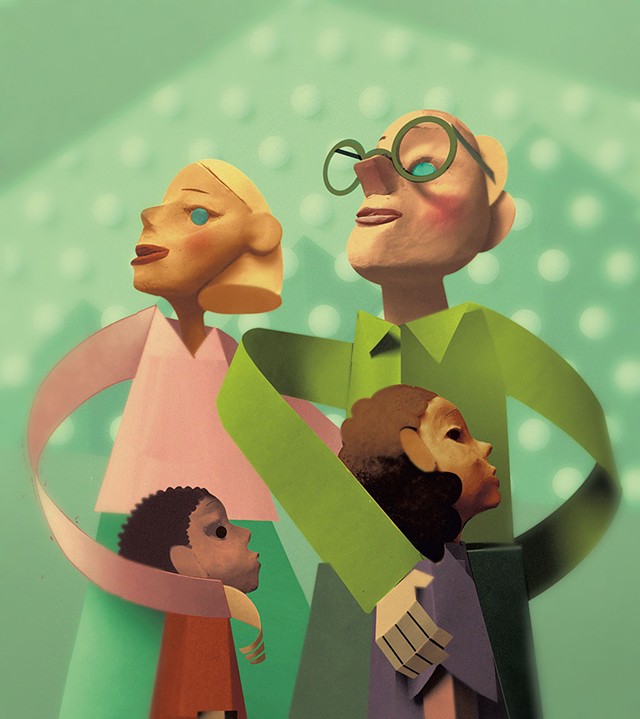Published December 12, 2018 at 10:00 a.m. | Updated December 13, 2018 at 7:14 p.m.
One of Corazon Swanberg's most vivid childhood memories is of being ridiculed in kindergarten because of her hair. "My mom just didn't have time to braid my hair, and so she had combed it out and just put it into puffs," said Swanberg, now a 23-year-old studying social work in Boston. "As soon as the door to the classroom shut, people were laughing at me because I looked different."
But it would be almost two decades before the former dancer, who is of mixed heritage including African American, talked about that profoundly significant event with her adoptive mother, Tory Rhodin, who is white.
Growing up as a person of color in the Upper Valley area, Swanberg was often the only minority student in class, she recalled. While she found support in a circle of fellow transracial adoptees and a mentoring program at Dartmouth College for minority children, she still faced plenty of challenges.
Swanberg's adoptive white parents were "woke," she said, and celebrated Kwanzaa with her. It became easier to talk to them about those early painful experiences as she got older.
Rhodin, a social worker, said her daughter's revelation made her sad. "It struck me that there were a lot of things that happened that we probably never heard about," she said. "She managed on her own, even though I had usually imagined we were more or less on top of things."
Transracial adoption, or raising a child of another race or ethnicity, always brings challenges, said Catherine Harris, the post-permanence program manager at the Vermont Department for Children and Families. While families may raise their children to be color-blind, the larger society is not. The experiences of white children are not the same as those of minority children.
"It's not always an easy childhood for children of color in Vermont," observed Harris. Transracial adoptees may feel additional alienation because their parents cannot relate to their experiences.
A tragic incident in California in March brought transracial adoption under public scrutiny: Jennifer Hart drove off a cliff with her wife and their six black adopted children. Child welfare officials in three states had received reports of abuse in Hart's home, and the investigation touched off online debates about the white women's motive in adopting black children.
In Vermont, transracial adoption came to the fore this summer after reports of racism by participants in a weeklong camp in Stowe for adopted children of color. Attendees said drivers slowed down to stare at them and hurl racial slurs. Seattle-based keynote speaker Angela Tucker, herself a transracial adoptee and an advocate for adoptee rights, said her taxi driver asked whether the gathering was an "inner-city kids' club" and expressed an interest in adopting "poor black kids."
The DCF does not have a breakdown of adoption and guardianship placements in Vermont according to race and ethnicity, Harris said. But national statistics indicate an overrepresentation of African American and Native American children in the child welfare system.
Anecdotally, Harris said she's seen an increase in the number of children of color in state DCF custody. International and private adoptions in Vermont have steadily declined over the years, while state adoption has seen a significant increase. Reflecting a nationwide pattern, most foster and adoptive parents in Vermont are white.
In the 1970s, the National Association of Black Social Workers and Native American groups declared their opposition to transracial adoption. That judgment weighed heavily on Rhodin's mind, she recalled. She initiated the process of adopting Swanberg only after consulting her friend Nadine, a black woman with whom she had worked on social justice projects.
"It was that conversation with Nadine, really," she said, "that helped me know that not just from within myself, which I was clear about, but within our social support network ... we would figure out a way to do this."
While transracial adoption is not the best option, it's a necessary one, Tucker said, because there are fewer adoptive minority families. It can work, she added, but parents who choose this path must be committed and have a lot of training.
The Vermont Consortium for Adoption & Guardianship receives state funding to provide direct support and resources to transracial families, including a physical library in Berlin and an online depository. This year, the group organized two training sessions for prospective and current parents.
Paraeducator Natasha Eckart Baning was invited to one such session to share her experience. A biracial adoptee who identifies as black, she was raised in Worcester primarily by her divorced white father. She spent her summers and school vacations with her adoptive mother, who lived in more culturally diverse areas. One of her messages for the audience was that adoptive parents need to ditch the "white savior" mentality, she said.
Kiah Palumbo, another adult transracial adoptee who spoke at a training, said she told parents not to expect their children to fit into their world. Instead, parents should make conscious efforts to bring diversity into their homes. "Kids need mirrors, so they can see people that look like them," said Palumbo, "and they need windows, so that they can see what the future has to hold."
Franklin County Probate Judge Vaughn Comeau and his wife, Sara, have attended the consortium's workshops. The white couple are parents of an African American daughter, Amelia, 4.
The Comeaus have decorated their home in Berkshire with images of black women and bought books with African American and African characters. These days, when she does Amelia's hair, Sara said, she talks about adoption and race.
"There are a few different journeys going at once," said Sara, who works at her husband's legal office in Enosburg Falls. "We just have to keep layering [them]."
But the suburban Baltimore native has heard from enough parents and adult transracial adoptees to be concerned about what her daughter will encounter as she grows older and meets new people. "I worry about what her introduction to racism is going to look like," said Sara.
Simone Cote, a private adoption counselor at Lund family center, said it's crucial that adoptees immerse themselves in their cultural background so they can develop a solid and positive racial identity. Belonging is a big theme in adoption, and children are eventually going to want or need to feel they belong with people who share that identity with them.
Palumbo said she found her community at Camp for Me, a summer day camp that was then in Waitsfield for adopted children. She loved being a camper so much that she became a counselor. "I met a lot of people I'm still friends with," she said.
Similarly, Swanberg got support from fellow transracial adoptees and the Dartmouth College students who became her mentors and big sisters. She also formed a close bond with a friend, Zamir Paley. In their teens, the two discovered they were biological siblings with family in Houston, Texas.
Rhodin said her family was fortunate to live in areas where they could build a multiracial community. But that's not easy in a predominantly white and rural state. Some Vermonters have found creative ways to circumvent the challenge, said the DCF's Harris. They vacation in more racially diverse cities and seek out cultural events, role models and support networks for their children.
Tucker takes a harder-line stance, arguing that such families have a responsibility to relocate to places where their children will be racially represented. "I really think that having a lack of racial mirrors in their town is a quasi-form of neglect," she said.
Tucker noted that many parents seek out a coach to guide their athletically gifted children; some even relocate for the best programs. "But for race, we see it so much differently, but really, it's not," she said.
Families need to enlist people who can offer the aspects of parenting they can't cover themselves, Tucker continued. One example: "Having conversations with black boys about policing in America is not going to come across the same from a white mom as it would from a black barber in your town."
That cultural gap is why Eckart Baning said she wouldn't advocate for transracial adoption, even though her own experience was a positive one. "There were definitely times where, as educated and intellectual and worldly as my parents were," she said, "they just didn't get it."
She recalled an instance in 2004 when she and her father argued over an incident at her alma mater, U-32 High School. Students from rival Montpelier High School raised a cross bearing the name of a black U-32 football player. Eckart Baning was upset, viewing the act as having clear associations with the Ku Klux Klan; her father didn't see racist undertones. A couple of days later, he apologized for looking at the issue from the perspective of a white male, she said.
"I don't think that most parents are that self-aware or that enlightened, to be able to reflect the way my dad did," the paraeducator added.
Despite her reservations, Eckart Baning agrees with most adoptees and adoption advocates that transracial adoption is preferable to having a child grow up in the system. "Every kid deserves a loving home," she said, "but only if the loving home really understands what it's undertaking."
The original print version of this article was headlined "Relative Issues"
More By This Author
Speaking of Transracial Adoption, adoption
-

Q&A: Alexis Dexter Rescued 57 Shelter Cats During the July Flood
Sep 13, 2023 -

Video: Two Months After the Flood, Alexis Dexter Rebuilds Kitty Korner Café in Barre and Continues to Rescue Cats
Sep 7, 2023 -

Vermont Visionaries: Theresa Tomasi, Mother of 27
May 3, 2021 -

Video: Kitty Korner Café in Barre Finds Furever Homes for Felines
Mar 25, 2021 -

I'm Seeing My Son and Grandson Less, and It Hurts
Jan 22, 2020 - More »
Comments (2)
Showing 1-2 of 2
Comments are closed.
From 2014-2020, Seven Days allowed readers to comment on all stories posted on our website. While we've appreciated the suggestions and insights, right now Seven Days is prioritizing our core mission — producing high-quality, responsible local journalism — over moderating online debates between readers.
To criticize, correct or praise our reporting, please send us a letter to the editor or send us a tip. We’ll check it out and report the results.
Online comments may return when we have better tech tools for managing them. Thanks for reading.
















































